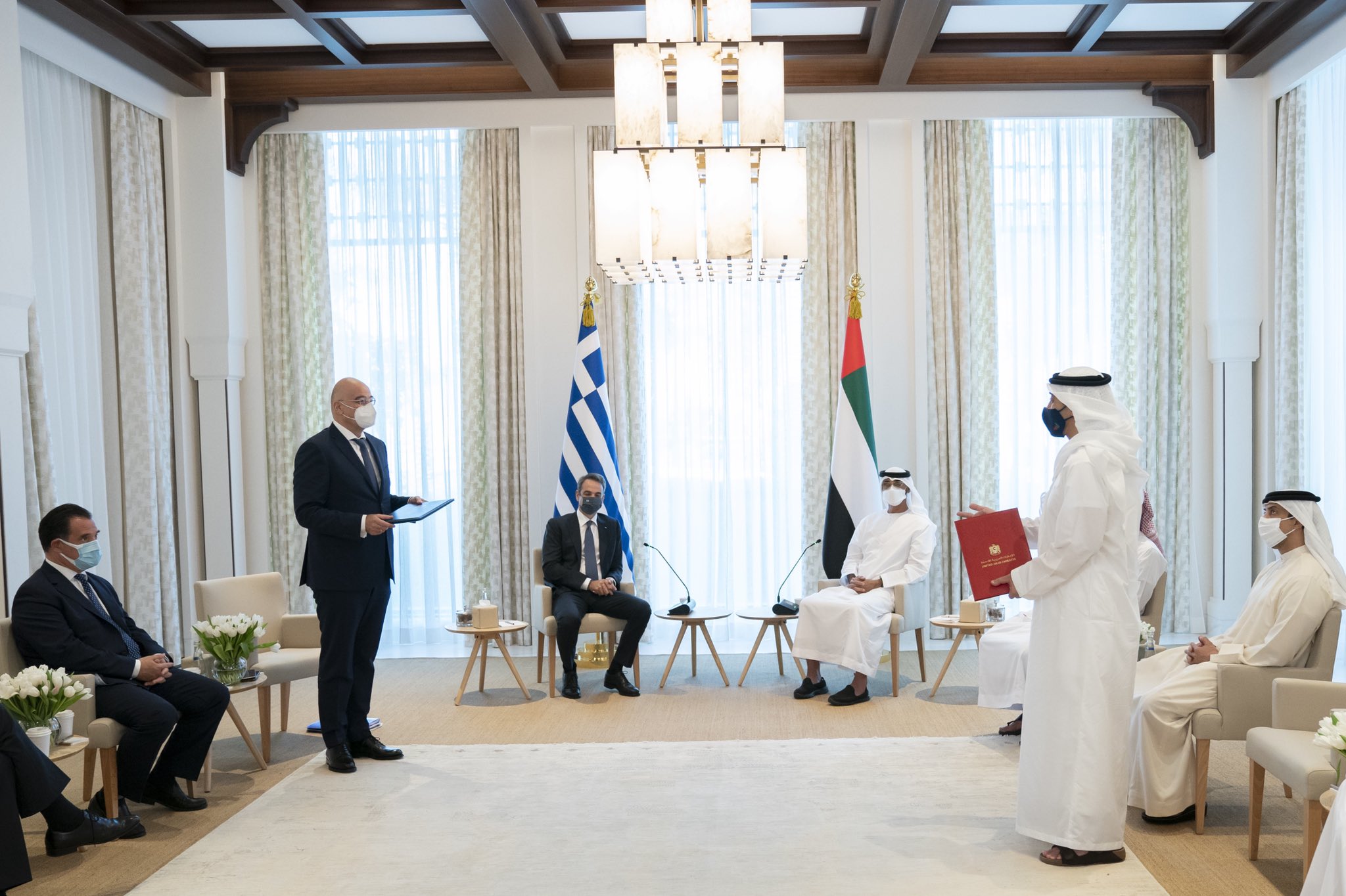Publications
INSS Insight No. 1458, April 25, 2021
Political and security relations between Greece and Cyprus on the one hand and the United Arab Emirates and Saudi Arabia on the other have taken a major step forward over the past year. Political meetings, security agreements, and joint military exercises hint at the possible emergence of a new regional alignment. Underlying this convergence is an effort to thwart Ankara’s regional ambitions by linking the Gulf to the Eastern Mediterranean, although this step is liable to exacerbate the existing tension in these theaters. It is possible that Israel’s partners in the Gulf would like to see more active involvement from Israel in countering Ankara. Although Israel has an interest in restraining Turkey’s activity in the region, the informal character of the Hellenic-Gulf alignment makes it easy for Jerusalem to keep a low profile and avoid increasing tension with Ankara.
The past year saw a major step forward in political and security cooperation between Saudi Arabia and the United Arab Emirates on the one hand and Greece and Cyprus on the other. In March 2021, Saudi fighter jets and transport planes flew to Greece in order to participate in the joint exercise Falcon Eye 1, a large-scale exercise and the first of its type for the two air forces. At the same time, a Saudi military delegation headed by Chief of Staff Lt. Gen. Fayyadh bin Hamed al-Ruwaili arrived in Greece for talks. This week the two countries agreed that Greece would loan Patriot missile units to Saudi Arabia to help protect critical infrastructure against attacks, mainly from Yemen. Greece strongly condemned these attacks, although following Iranian objections, emphasized that the systems were defensive and had no offensive capabilities. Riyadh will reportedly not only finance the deployment of the systems and the teams, but will also upgrade the systems for Greece.
Relations between the UAE and Greece have warmed to an even greater extent. In August 2020, one week after the announcement of the normalization agreement between Israel and the UAE, Abu Dhabi sent fighter jets and ground crews to Greece in order to participate in a joint exercise by the two air forces. In November 2020, during a visit to Abu Dhabi by the Greek prime minister, the two countries signed a major strategic partnership agreement that reportedly includes a significant security element.
High-level political meetings join the security cooperation. In May 2020, following a meeting on a virtual platform, the foreign ministers of Greece, Cyprus, Egypt, United Arab Emirates, and France issued a joint statement condemning the dispatch of Turkish drilling ships to Cyprus's economic waters. In February 2021, a summit attended by the foreign ministers of Greece, Cyprus, United Arab Emirates, Saudi Arabia, Bahrain, Egypt, and France was held in Greece. In mid-April 2021, a meeting attended by the foreign ministers of Cyprus, Greece, and Israel and the former UAE foreign minister, now an advisor to the UAE president, took place in Paphos, and the Cypriot foreign minister noted, "The evolving web of regional cooperation is creating a new narrative."
Shared Interests
The regional upheaval and natural gas discoveries in the Eastern Mediterranean constitute the background for the expanded ties between the Gulf theater and Eastern Mediterranean theater, compounded by assertive regional policies by Ankara on the one hand and United Arab Emirates (which took the lead) and Saudi Arabia on the other. Ankara, Riyadh, and Abu Dhabi have competed with each other to shape the regional order following the upheaval in the Middle East, and since 2017, the Turkish military base in Qatar has been an ongoing source of tension between the three countries. These countries also began intervening in theaters marked by instability and power vacuum remote from their borders. The involvement of various actors in the civil war in Libya and other such developments has a substantial impact on events in the Eastern Mediterranean. In addition to construction of military bases, ports, and support for proxies, the countries have tried to form alignments, albeit loose ones, in order to promote their interests.
In recent years, Riyadh and Abu Dhabi have considered ways of deepening the cooperation between them and other countries alarmed by Turkish assertiveness, especially in the Mediterranean Sea and the Red Sea, with the aim of expanding the boundaries of their influence and involvement. Similar motives also contributed to the normalization agreement between Israel and the United Arab Emirates, which regard Ankara as a geostrategic rival, and in the case of Abu Dhabi, also an ideological one. These developments fit in well with diplomatic initiatives by Cyprus and Greece involving the Eastern Mediterranean.
Like the talks and meetings between senior figures on both sides occurring with increased frequency, the air exercises are more designed to show the Gulf's support and solidarity with Greece than to test the fitness of the countries' militaries, given the significant increase in tension in the Eastern Mediterranean in 2020, and to signal to Ankara an alignment of countries determined to obstruct its assertive policy. References to Israel in reports of growing cooperation between Greece and the Gulf countries are not infrequent. The UAE and Israel also took part in an international air exercise in Greece this April, and in contrast to previous years, Abu Dhabi allowed its participation in an exercise together with Israel to be public.

The significant strengthening of the geopolitical element in the ties between the Gulf states and Greece is something that has occurred only in the past few years. Previously, the connection between the Gulf theater and the Eastern Mediterranean was based primarily on economics and trade, although on a fairly limited scale. Bilateral trade between Saudi Arabia and Greece totaled approximately $1 billion in 2020, while bilateral trade between Greece and United Arab Emirates totaled approximately $400 million in 2019. For the sake of comparison, bilateral trade between Turkey and Saudi Arabia totaled approximately $5 billion, and bilateral trade between Turkey and United Arab Emirates totaled approximately $7 billion in 2018.
In many aspects, the tension with Ankara has made the United Arab Emirates Greece's closest Arab partner. Athens supports Abu Dhabi's efforts in Syria, and in Libya conducted a dialogue with General Haftar, who has been supported by the UAE, at least until recently. For their part, by strengthening their ties with Athens (and with France, which is also in the anti-Turkish camp), Abu Dhabi and Riyadh strive to not only counter Turkey's growing assertiveness, but also to achieve closer ties with Brussels and strengthen their relations with the European Union.
The closer relations between several Gulf countries and Greece are forming in tandem with efforts to adjust Turkish foreign policy since Biden's election as United States president. These efforts are underway, inter alia, with Saudi Arabia, the United Arab Emirates, and Greece, and are accompanied by a certain degree of pragmatism by Ankara, which has declared its desire to restore proper relations with these countries. Ankara nevertheless finds it difficult to prove to the parties involved that its efforts to jumpstart its relations with them are sincere, and that its motive is not merely to break up the alignment of countries against it.
A Permanent Alignment?
Although the permanence and binding nature of this alignment is questionable, it is possible, especially given the defense agreement signed by the UAE and Greece, that the parties expect aid and support from each other for their respective interests and needs, including economic. The military power of United Arab Emirates and Saudi Arabia is insufficient to change the balance of power between Greece and Turkey in the Eastern Mediterranean, and Greece's military contribution to the defense of the Arabian Peninsula is also negligible. The alignment, however, even if it is temporary and nonbinding in nature, has considerable political significance, because it increases Ankara's isolation and forces it to reconsider its regional policy.
The strategic motives that have led several Gulf states to increase their involvement in the Eastern Mediterranean in recent years are to a large degree transient, and depend on circumstances. For example, the changes and adjustments in Turkish policy and in US policy in the region will certainly affect the need of the Gulf states for a military presence in a remote theater. A Turkish retreat from its assertive policy, should one occur, will contribute to looser future relations between the Hellenic countries and the Gulf states. In addition, if the United States succeeds in balancing between its desire to reduce its involvement in the Middle East and the need to deliver a message to its regional allies that it is not abandoning them, the interest of the regional parties in taking independent action will wane. Since the current trends in the region seem to be running in the opposite direction, however, and given the strategic balance and common attitude toward Turkey, what is now temporary may become permanent, and the emerging Hellenic-Gulf alignment may take root.
Israel has an interest in restraining Turkey's assertive policy in the region, but is not the party taking the initiative in this matter. Israel's partners in the Gulf may like to see more active involvement on Israel's part in countering Ankara, and coordination of expectations with them on this matter is therefore necessary. While it is clear which side Israel is on, and Israel itself has strengthened its relations with Greece and Cyprus in the past decade, Israel's geographic proximity to the focus of the tension between Greece and Turkey requires great caution on its part. This is particularly true given that there are more significant challenges facing Israel, above all Iran. For example, in commenting on the Paphos meeting, Israeli Minister of Foreign Affairs Gabi Ashkenazi emphasized the threat posed by Iran and Hezbollah. While statements by decision makers of various countries have mentioned on more than one occasion that the alignment's purpose goes beyond any one specific threat and that it is designed to bolster regional stability, without Turkey's assertive actions, it is doubtful whether relations would have reached this level.



